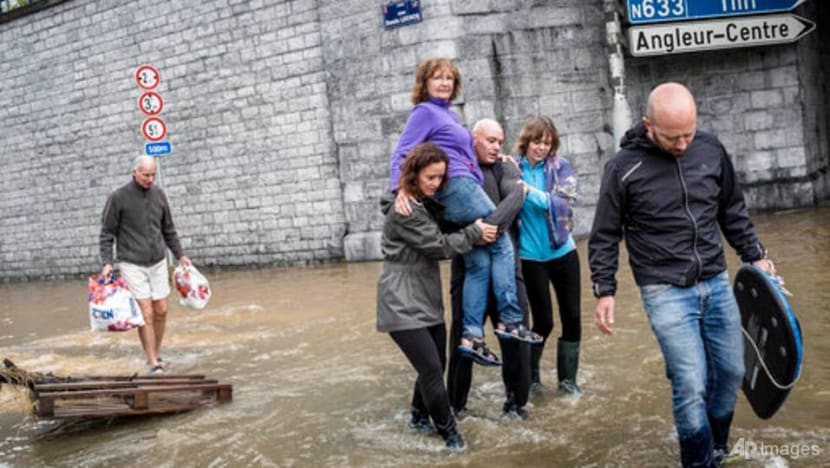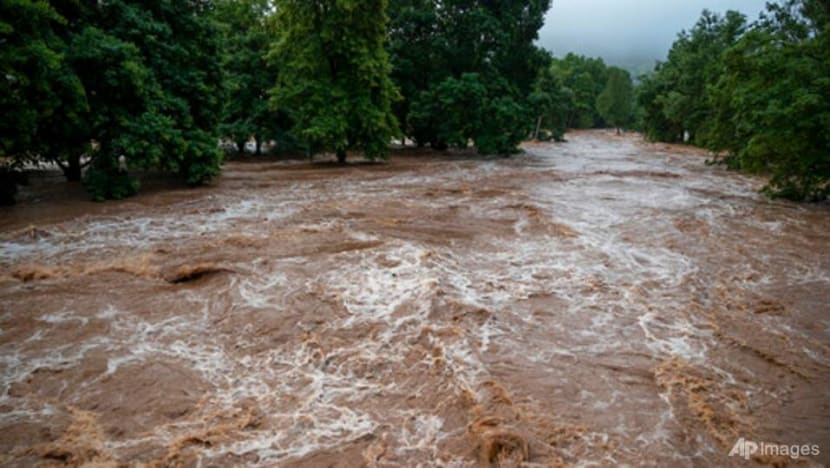Floodwaters still rising in western Europe with death toll exceeding 120

A woman is carried through a flooded street in Angleur, Province of Liege, Belgium, Jul 16, 2021. (Photo: AP Photo/Valentin Bianchi)
SCHULD, Germany: More than 1,000 people were missing and more homes were destroyed in flood-stricken regions of western Germany and Belgium on Friday (Jul 16) where waters were still rising and the death toll was already at about 117.
Entire communities lay in ruins after swollen rivers swept through towns and villages in the western German states of North Rhine-Westphalia and Rhineland-Palatinate, Belgium as well as the Netherlands.
"It was so terrible, we couldn't help anyone. People were waving out of the windows," Frank Thel, a resident of Schuld, told Reuters in front of a pile of rubble in the Rhineland-Palatinate town, where several buildings had collapsed.
In Germany alone, 103 people have died in what is the country's worst mass loss of life in years.
Twelve of the dead were residents of a home for disabled people in Sinzig south of Cologne who were surprised by the flash floods during the night.
The death toll is expected to rise further as more houses collapsed, while in Belgium, media said at least 14 had died.
About 114,000 households in Germany were without power and mobile phone networks collapsed in some flooded regions, which meant that family and friends were unable to track down their loved ones.
"Our state is experiencing a flood catastrophe of historic dimensions," North Rhine-Westphalia premier Armin Laschet said, citing extensive damage in 23 towns and rural districts.
German President Frank-Walter Steinmeier on Friday urged a more "determined" battle against global warming in light of devastating floods in the west of the country triggered by unusually heavy rainfall.
"We will only be able to curb extreme weather situations if we engage in a determined fight against climate change," Steinmeier said in Berlin.

"I fear that we will only see the full extent of the disaster in the coming days," Chancellor Angela Merkel said from Washington late Thursday, where she met with President Joe Biden.
"My empathy and my heart go out to all of those who in this catastrophe lost their loved ones, or who are still worrying about the fate of people still missing."
Merkel held a video conference with Laschet who updated her on search and rescue efforts, a government spokeswoman said, adding that the chancellor plans to visit the affected areas soon. German public broadcaster ARD said Merkel will visit Schuld, one of the worse-hit towns, on Sunday.
COLLAPSED INFRASTRUCTURE
In Rhineland-Palatinate, around 1,300 people were reported missing in the Ahrweiler district south of Cologne, the district government said on Facebook.
Further north, in Erftstadt near Cologne, several houses collapsed on Friday morning, and authorities feared casualties.
Residents had been evacuated but some returned home so officials do not know who might be in the houses, district commissioner Frank Rock said, adding: "We are expecting deaths."
READ: At least 68 dead in Germany, Belgium as storms ravage Europe
Roads around Erftstadt were impassable as they were washed away by the floods. Rescue crews tried to reach residents by boat and had to rely on walkie-talkies to relay information.
"The network has completely collapsed. The infrastructure has collapsed. Hospitals can't take anyone in. Nursing homes had to be evacuated," a spokeswoman for the regional government of Cologne said.
A district spokesman said about 55 people have been rescued and 15 are still trapped in their houses there.
One dam close to the Belgian border, the Rurtalsperre, flooded, while another, the Steinbachtalsperre, was stabilised early on Friday.
Some 4,500 people have been evacuated from communities downstream, and a stretch of the A61 motorway has been closed amid fears of a breach.
The German military has deployed over 700 soldiers to help with rescue efforts.
REINFORCING DIKES
Thousands of residents in the north of the Limburg province in neighbouring Netherlands were ordered to leave their homes early Friday as floodwaters peaked.
Emergency services were on high alert, and authorities were also reinforcing dikes along vulnerable stretches where floodwaters continue to rise.
Waters were receding in the southern city of Maastricht, where there was no flooding and in the town of Valkenburg, where damage was widespread, but no one was hurt.
In Belgium, at least four people were missing. The Belgium crisis centre has urged people in large parts of the south and east of the country not to travel.
France sent 40 military and a helicopter to Liege in Belgium to help with the flood situation, Prime Minister Jean Castex said on Twitter.
"The waters are rising more and more. It's scary," Thierry Bourgeois, 52, said in the Belgian town of Liege. "I've never seen anything like it."
In the town of Maaseik, on the Dutch border, the Meuse had risen beyond a retaining wall and was spilling past bags placed on top.
Several towns and villages were already submerged, including Pepinster near Liege, where around 10 houses partially or fully collapsed.
The death toll in Germany is the highest of any natural catastrophe since a deadly North Sea flood in 1962 that killed around 340 people. The crash of a high-speed ICE train in 1998 killed 101 people.
Floods at the Elbe river in 2002, which at the time were billed by media "once-in-a-century floods", killed 21 people in eastern Germany and more than 100 across the wider central European region.
European Commission chief Ursula von der Leyen said the scale and intensity of the flooding was a clear indication of climate change and demonstrated the urgent need to act, echoing an earlier message from Merkel.
German Interior Minister Horst Seehofer told magazine Spiegel the federal government aimed to provide financial support for the affected regions as quickly as possible, adding a package of measures should go to the cabinet for approval on Wednesday.










